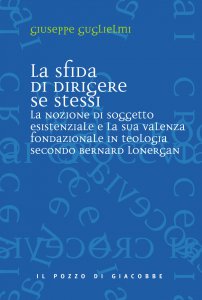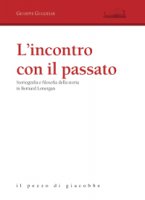La sfida di dirigere se stessi. Soggetto esistenziale e teologia fondazionale in Bernard Lonergan
(Ai crocevia)EAN 9788861240575
Impresa ardua è entrare nella consapevolezza e responsabilità della costru-zione della propria vita e, in primo luogo, del compito di darle un senso definitivo. Una sfida, dunque. La sfida di dirigere se stessi è la chiave privilegiata scelta dall’A. di questo denso volumetto che tenta di offrire una lettura dell’opera filo-sofica e teologica del grande pensatore canadese e maestro di spirito del secolo scorso, Bernard Lonergan, s.j. (1904-1984). Al punto di partenza dell’analisi troviamo il Soggetto esistenziale, e questo non tanto per un bisogno psicologico e filosofico di scandagliare il variegato e contradditorio mondo interiore della per-sona umana, quanto per afferrarne il processo dinamico di auto-superamento e di auto-trascendenza che esso racchiude in sé come dono e come compito. È «il soggetto del flusso di coscienza, il soggetto concreto e incarnato, che ha a che fare con il progresso e il regresso, lo sviluppo e il declino, la crescita normativa e le deviazioni. È questo il senso in cui Lonergan parla di soggetto: meno legato alle proprietà della natura umana e più interessato alla sfera dei sentimenti, dell’intelligenza, della ragione, della volontà, dell’esercizio della libertà e della responsabilità e delle scelte che lo fanno essere ciò che è» (p. 39). L’approdo di questo cammino esistenziale è l’evento e la realtà dell’innamoramento, punto più alto dell’auto-trascendenza e, in quanto «innamoramento di Dio», apex animae. Il volumetto è da considerarsi un riuscito reader dell’opera di Bernard Lonergan, il cui pensiero viene ricostruito con accuratezza e coinvolgimento, facilitando così al lettore le piste di ricerca personale per un ulteriore approfondimento e per suscitare quella «sfida a se stessi» intesa come una con-versione di rotta dell’agire etico e religioso.
L’A. si sofferma, in primo luogo, sull’antropologia di Lonergan, mettendo in evidenza il valore della coscienza intenzionale con la sua struttura, i suoi quattro livelli e le sue quattro operazioni, focalizzando i cinque precetti trascendentali che ne conseguono: «Sii attento; sii intelligente; sii ragio-nevole; sii responsabile; sii innamorato». Occorre però vigilare sul fatto che, co-me sottolinea l’A., «l’effettiva validità di questo procedimento risiede nel perso-nale impegno e nella decisione libera del soggetto»: sii libero. Con l’appro-fondimento del quarto livello della coscienza viene così scongiurato «il pericolo di intendere il metodo [di Lonergan] con i caratteri di uno strutturalismo precon-fezionato» (72). È in realtà, questo, uno dei compiti più faticosi per l’uomo: tro-vare la strada verso l’interiorità. A tal proposito, molto ricca risulta la riflessione che l’A. di questo studio dedica alla dialettica, ossia all’analisi dei processi di crisi e dei conflitti interiori ed esteriori del soggetto esistenziale. È soprattutto in questo ambito che risulta chiara la conoscenza e padronanza precisa delle fonti. La vera sfida di dirigere se stessi si concretizza nell’ultima fase del cammino, sul quale il Soggetto esistenziale prende coscienza di un dinamismo interiore e stori-co che lo porta ad andare oltre se stesso e scoprirsi Soggetto religioso, ossia uo-mo di fede – che altro non è che l’uomo innamorato e in particolare l’uomo in-namorato di Dio.
«Questo stato dinamico di essere innamorati non costituisce un ulteriore livello della coscienza, ma “occupa il fondo e la radice del quarto e su-premo livello della coscienza intenzionale dell’uomo”, inserendosi così alla sommità dell’anima» (p. 87). In questo modo Lonergan riesce a far comprendere che è l’amore, e non la conoscenza, «a rivestire un ruolo determinante nell’orientamento della autenticità personale e alla ricerca di Dio» (p. 167). da qui nasce la necessità di una revisione dei rapporti tra filosofia e teologia, tra fede e ragione, tra grazia e natura; rapporti che rivelano, a differenza del passato, una complessità e una difficoltà nuova. È merito dell’A. qui aver messo bene in evi-denza il carattere affettivo-recettivo della fede come conoscenza nata dall’amore religioso, il solo capace di aprire il soggetto all’accoglienza della Rivelazione. È un atto conoscitivo, la cui ragionevolezza non deriva da prove estrinseche, di na-tura logico-trascendentale, ma dalla logica intrinseca al soggetto innamorato, che liberamente si affida a Dio. Ora per poter amare qualcuno è necessario prima co-noscerlo in una certa qual misura, come afferma S. Agostino: «Non diligitur quod penitus ignoratur» (In Ioann. ev., tract. 96, 4), ovvero «nihil amatum nisi praecognitum», la conoscenza precede l’amore. Come scrive Lonergan, tuttavia, nel suo celebre Method in Theology «la verità di questo detto sta nel fatto che ordinariamente le operazioni al quarto livello della coscienza intenzionale pre-suppongono e completano operazioni corrispondenti agli altri tre livelli. C’è un’eccezione secondaria a questa regola, in quanto gli uomini si innamorano e tale innamorarsi è qualcosa di sproporzionato rispetto alle sue cause, alle sue condizioni, alle sue occasioni, ai suoi antecedenti. Il motivo è che l’inna-moramento rappresenta un inizio nuovo, un esercizio della libertà verticale nella quale il proprio mondo viene sottoposto a una nuova organizzazione. Ma l’eccezione più importante al detto latino viene dal dono che Dio ci fa del suo amore, il quale amore inonda il nostro cuore.
Allora siamo nello stato dinamico dell’essere innamorati. Ma chi sia colui che noi amiamo non è dato né è ancora capito. La nostra capacità di autotrascendenza morale ha trovato un adempimen-to il quale reca una gioia intima e una pace profonda. L’amore ci rivela valori che prima non apprezzavamo, il valore della preghiera e dell’adorazione, del pentimento e della fede. Ma se vogliamo sapere che cosa stia avvenendo dentro di noi, se vogliamo imparare a integrarlo con il resto della nostra vita, dobbiamo indagare, investigare, domandar consiglio. È così che, nelle cose della religione, l’amore precede la conoscenza e, poiché questo amore è dono di Dio, lo stesso initium fidei è dovuto alla grazia di Dio» (tr. it., Roma 2001, 155-156). Il rifiuto di Dio nell’uomo contemporaneo è da ricercarsi per Lonergan in ultima analisi, dunque, nella disaffezione, ossia nella indifferenza religiosa, per cui la domanda religiosa stessa non viene più posta. Compito della teologia fondamentale resta la riflessione fondazionale: mettere in rilievo la valenza conoscitiva e affettiva della esperienza religiosa e la necessità della istanza ermeneutica della fede. Un lavoro che bene farebbero i teologi a svolgere per restare fedeli all’eredità del Vaticano II e uscire così dalle secche di una visione statica e intellettualistica delle fede e della Rivelazione. Un libro in definitiva piacevole nella lettura, stimolante per l’analisi e la riflessione, consigliabile non solo per teologi di professione ma anche per coloro che sono alla ricerca della verità su di sé e su Dio.
Tratto dalla Rivista di Scienze Religiose n. 2/2009
(http://www.facoltateologica.it/rivistadiscienzereligiose.html)
Despite Method in Theology, it is not very well known that Lonergan’s anthropology goes beyond the knowing subject to embrace the existential subject. Again, it is quite possible to read Method and miss completely Lonergan’s highly original approach to the question of faith and fundamental theology. Guglielmi’s La sfida di dirigere se stessi both focuses on the notion of the existential subject in Lonergan and indicates its relevance to a re-elaboration of fundamental theology “in a foundational key”. In the process, the author also highlights the relevance and fecundity of Lonergan’s thought for fundamental theology against the background of current thinking on the topic in Italy. Born at Barletta (Bari) in 1976, Giuseppe Guglielmi holds a doctorate from the Gregorian University and is currently “assistant” of theological anthropology in the Pontificia Facolta? Teologica dell’Italia Meridionale, Sezione S. Luigi, Naples. With the present book, he joins the ranks of the small but growing group of Lonergan scholars in Italy.
La sfida… is articulated in two parts. The first part presents Lonergan’s thinking on the existential subject in its emergence as well as in a more systematic key, highlighting the fact that the human being is constituted not only by consciousness but also by meaning and historicity. The second part examines the dialectical development of the concrete human subject. In its movement of self-transcendence, the human subject is constantly confronted with the choice between authenticity and inauthenticity, and the attainment of authenticity does not happen without the gift of God’s grace. The analysis of the existential subject thus opens up to the religious dimension, and so reveals its relevance to fundamental theology. Lonergan’s core solution to the problem of fundamental theology involves the proper recognition of the primacy of love in all its ramifications. Faith and love, in other words, do not need justification. Fundamental theology is liberated from the necessity of proving the truths of faith, recognizing that the true foundations of theology lie in the reality of the concrete subject characterized by presence or absence of intellectual, moral and religious conversion. Theological method consists in a progressive objectification of the basic horizons of the subject, of what has happened to us, of the love that has taken possession of our lives. The core of this method consists in the specialties “dialectic”, which brings to light a variety of options, and “foundations”, which makes a deliberate choice among these options. But to choose a horizon is to choose also the doctrines that make sense within that horizon. Guglielmi is keenly aware of the primacy of method over logic: there is no way of logically shifting from one horizon to a radically different one; that is, precisely, a matter of conversion, not proof. His major weakness is that he does not go into the dynamics of the functional specialty dialectic, and so fails to indicate an important element in Lonergan: that the search for truth is not only dialectical but also communitarian and, in the end, dialogical. Guglielmi invokes the fundamental theology of H. Verweyen as a foil for Lonergan’s approach, a sort of “clarification by contrast”. For both Verweyen and Lonergan meaning is a central category. Verweyen, however, insists on a “philosophically autonomous” acquisition of a definitively valid concept of meaning that can provide a framework (griglia) for the ‘once and for all’ self-communication of God; his fundamental theology is thus of a “logical-transcendental” type.
Lonergan, instead, does not directly and explicitly thematize the question of meaning, but inserts it within his wider study of the existential subject. Meaning is constitutive of the subject: the subject constitutes itself through its decisions and especially its fundamental options; and as constitutive of the subject, meaning provides foundations for theology. According to Guglielmi, Lonergan’s existential approach also helps understand and respond in a more adequate way to the postmodern rejection of the question of meaning and the phenomenon of religious indifference, for if the question of God arises basically at the level of the existential subject in love, it follows that the rejection of God is not a merely intellectual affair but stems rather from disaffection and disinterest. It follows that the task of fundamental theology will be that of recovering the centrality of religious experience and accompanying concrete subjects in their religious living. As far as “functional specialties” are concerned, Guglielmi’s effort is largely interpretation. The work ranges over the whole of the Lonergan corpus and indicates a familiarity with the archival matter as well. He brings to our notice, for example, a little known item with the title “Existential Crisis” (1968). The existential subject is rightly identified as the most complete phase in the anthropological thought of Lonergan, and so justifies Guglielmi’s decision to concentrate on the “existential turn” in the summer seminars following the publication of Insight and the work of the mid-sixties, and on Method in Theology and the work of the eighties in which this turn is integrated with the religious factor. A greater attention to Insight, however, might have led to a better grasp of how exactly, for Lonergan, objectivity is the fruit of authentic subjectivity. It is not quite correct to say, for example, that the proximate criterion deals with “objective evidence” while the remote criterion deals with the subject. What Lonergan says is that the objectivity that is reached is independent of the subject, but it is not reached in independence of the subject; and that reaching involves both proximate and remote criterion. Insight’s analysis of the proximate criterion of truth is well worth a close analysis; it is one of those things that make Lonergan’s work so precious and even unique. On the other hand, our author specifies well the intersubjective nature of the attainment of truth, but could have drawn with profit on the Method of Theology course of Georgetown (1964), with its by now well-known statement about the mutual self-mediation of the subject through a tradition. Some of the expressions regarding grace and conversion would need to be refined. I do not think, for example, that grace should be described as a response to the emergence of the dimension of love (56): the whole point of operative grace is that it is completely God’s initiative.
Again, conversion, at least in Lonergan’s usage, cannot be described without qualification as a movement from above downwards (176): it is religious conversion that is (part of) the motive force for the descending movement; conversion in general is a 180 degree turn, a vertical shift. Further, Guglielmi tends to distinguish religious experience and religious conversion, whereas my impression is that in Lonergan’s usage they almost always coincide: operative grace is God’s gift of his love, God loving us into loving him, God turning our hearts to himself when our hearts do not want to turn to him. To be loved by God is to undergo religious conversion (though this can be “actual” or else something more permanent). To find oneself in love with God in this way is the religious experience. Yet again, Guglielmi also tends to understand revelation as the gift of God’s love – not exactly Lonergan’s own usage, in my opinion. Guglielmi also distinguishes between “foundational theology” which deals with the existential subject and with religious experience, and “theology of the foundations” which deals with the traditional treatises of fundamental theology such as Christ, Church, and the doctrines of inspiration, tradition, and the magisterium. Is such a distinction really necessary? For Lonergan these treatises, like any other doctrines, fall under the competence of the functional specialty, doctrines. Granted all this, however, I must confess that I have enjoyed reading this book, especially for the facility with which Guglielmi is able to recast Lonergan’s work from the point of view of the existential subject. It is, as the author himself says, an attempt to insert Lonergan’s original thinking into the contemporary panorama of Italian fundamental theology; and I must say that it is a very good attempt.
We look forward not only to more Lonergan scholarship from the author, but also actual attempts to rework the classical doctrines of fundamental theology in a methodical manner. Given that theological method is intrinsically collaborative, would it be too much to expect interaction on the latter issue with Gerard Whelan of the Gregorian University, another Lonergan scholar with a specialization in fundamental theology? Both Guglielmi and Whelan participated in the International Lonergan Conference held at the Istituto Italiano per gli Studi Filosofici at Naples, 13-15 May 2008, and it would be interesting to see what their collaboration might produce.
Tratto dalla rivista "Salesianum" 72 (2010) 2, 387-389
(http://las.unisal.it)
-
18,00 €→ 17,10 € -
20,00 €→ 19,00 € -
15,00 €→ 14,25 €

































